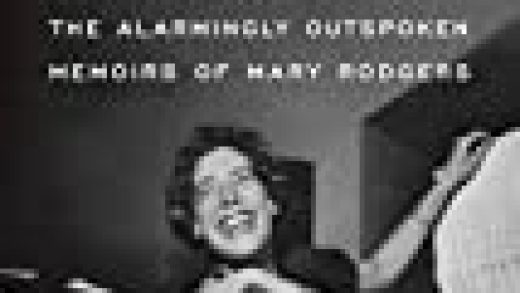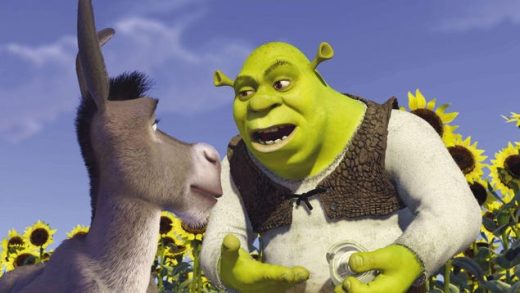The Birdcage was my introduction to drag. I was just a kid when my family and I serendipitously stumbled upon the movie on television one night, and the opening scene entranced me. Six beautiful ladies were dancing and singing Sister Sledge’s “We Are Family” in a glamorous night club! The glitz and glamor of it reminded me of the dazzling muses from Disney’s Hercules, with performances bursting with verve and sisterhood. That is, right up until the queens stomped off stage and did a revealing quick change.
As bras came off to reveal hairy chests and bulges were uncovered by skirts, I felt like I had stumbled upon a thrilling secret about the world beyond my living room. The Birdcage taught my mom terms like “butch” and “femme,” while it welcomed me into the wonder of drag. And I loved it. Who wouldn’t want to dress up in pearls and sing along to disco? I was doing it as a kid anyway, admittedly to Britney Spears, but still! It was glorious. These drag queens never felt “scary.” Instead, they felt like ambassadors who would welcome me with open arms, embracing me without question — even if I had questions!
Almost 30 years later, The Birdcage still serves as a highly enjoyable ambassador for some aspects of queer culture — ones that are now as mainstream as they are in some ways more contentious than ever. The film is hugely entertaining, but it’s also educational without being pedantic. While some parts of The Birdcage may feel dated out, the film itself triumphs as a celebration of queerness, chosen family, and the journey it takes to find that family — just like the titular track that opens it.
67 essential LGBTQ films to stream this Pride Month
What’s The Birdcage about?

Credit: Moviestore/Shutterstock
Directed by Mike Nichols, this 1996 remake of the French film La Cage aux Folles re-imagines its comedy culture clash in contemporary America. The cast is packed with giants of the stage and screen, with Robin Williams, Nathan Lane, Hank Azaria, and Christine Baranski appearing alongside Diane Wiest and legendary tough-guy actor Gene Hackman as a counterpoint.
The film follows a middle-aged gay couple who operate a Miami drag club called The Birdcage. Armand Goldman (an electric Williams) is the nightclub’s owner/director, and he sports a mustache that’d put Tom Selleck to shame. He’s basically one gold chain necklace away from being Gianni Versace himself. His partner Albert (brilliantly played by Lane), is the nightclub’s main attraction, Starina, with panache and comedic timing so dazzling that he could easily be the lovechild of Liza Minnelli and Patti LuPone.
Armand and Albert are also parents to college student Val (Dan Futterman), who shocks them with his plans to marry — but wait, there’s more. Val’s sweetie Barbara (a pre-Ally McBeal Calista Flockhart) is the daughter of a staunchly conservative Republican senator, Kevin Keeley (Hackman). Naturally, there must be a meet-the-parents moment that could make or break this engagement. So, how does this unapologetically gay couple appease their future in-laws? They try to “play it straight,” bringing in Playboy magazines, taxidermy, and even Val’s mother (Baranski) for good measure.
The Birdcage brought queer love into the mainstream at a pivotal moment.
The Birdcage was a daring release for its decade. The ’90s saw the “Don’t Ask Don’t Tell” policy being introduced in the military in 1994, which essentially allowed queer people to join the military so long as they stayed closeted. The Defense of Marriage Act, which defined marriage as a union between a man and a woman at the federal level, was implemented in 1996. And homophobia following the social aftermath of the AIDS epidemic in the ’80s was still rampant. It was a turbulent time that saw further ostracism of queer people, recognizing their existence legally only to dismiss them entirely through laws that weren’t protecting them.
In this homophobic landscape, two actors known and loved for family-friendly films like Aladdin, The Lion King, and Mrs. Doubtfire — in which Williams played a straight man in drag — teamed up to tell a story of boldly gay love and family in a wide-release studio comedy.
39 binge-worthy LGBTQ TV shows to watch this Pride
The Birdcage navigates the contentions of the decade through the ideological debate between the Keeleys and the Goldmans. While the film lightens the mood with funny scenes, like when they gather around a piano to sing “I Could Have Danced All Night” from My Fairy Lady, underneath the jest is a more profound commentary on empathy. Though welcomed into the Goldmans’ home under false pretenses, the conservative Keeleys witness the unquestionable love in this gay family, and they ultimately come to accept Armand, Albert, and Val into their family, and vice versa. For the audience, this happy ending becomes entirely plausible because of how Kevin and Albert connect, with drag as a kind of candy coating. The Birdcage is hellbent on reminding audiences that queer people (or drag queens for that matter) aren’t to be feared or damned. Here, drag is shown as a tool for truth and as an escape from the everyday — both figuratively and literally, in that dressing Kevin in drag allows the Keeleys to elude the paparazzi.
Sure, some of The Birdcage‘s humor may not necessarily land now, including Azaria’s “faithful houseman” Agador Spartacus, but the film is still an important landmark of queer cinema. Years ahead of its time upon its release in 1996, The Birdcage humanized its gay protagonists rather than side-lining them as sidekicks, villains, or clowns. Plus, it showed drag in a queer context, instead of as a tool for straight men to get laughs. And it was a box office hit, scoring over $185 million worldwide and praise from critics. Perhaps it’s because above all else, even beyond its brilliant one-liners and improv like Williams’s timeless “fuck the shrimp,” The Birdcage is about the universal power of family and unconditional love. Everyone was invited into the show, the fun, and the loving Goldman family.
The Birdcage is a wonderful love letter to the queer community that’s as relatable as ever.

Credit: Lorey Sebastian/United Artists/Kobal/Shutterstock
As the film’s heroes, Armand and Albert are fearlessly unapologetic about who they are. Through that very fearlessness, you will fall in love with them and maybe even find some inspiration.
Albert is proud of his femininity and maternal nature. “One does want a hint of color,” he pleads in defense of his pink socks, and Armand says of his mothering of Val, “Albert is practically a breast.” His acts of resistance to gender conformity urge the audience to embrace their own explorations in self-expression.
For his part, Armand is proud of his sexuality, their partnership, the business — and the gay sanctuary — he and Albert built together with the titular nightclub. But it wasn’t an easy journey, as he makes clear in a powerful speech, declaring, “Yes, I wear foundation. Yes, I live with a man…but I know who I am, Val. It took me 20 years to get here, and I’m not going to let some idiot senator destroy that.”
In dramatic scenes about politics and parenthood, The Birdcage pleads for queer humanity. But in much of its humor, it celebrates the culture’s creativity. From Armand’s unforgettable choreography scene to Albert’s “pirin” tablets, The Birdcage is abundant with memorable bits and gags that are eternally quotable. (My personal favorite is when Albert declares, “I was adorable once, young and full of hope. And now look at me, I’m this short, fat, insecure, middle-aged THING!”) This fiercely funny film makes us feel so good that we can even buy its idyllic epilogue, a message of hope and a resolution we can all wish to strive for and achieve.
In the almost 30 years since The Birdcage hit theaters, we’ve seen attitudes towards drag change wildly. Drag has moved beyond the nightclub and into so-called mainstream pop culture, with drag taking over social media and RuPaul‘s Drag Race winning a slew of Primetime Emmys, as well as the growing popularity of drag brunches and drag queen story hours across the country. Yet at the same time, anti-drag bills (and attacks on LGBTQ rights and bodily autonomy in general) are sweeping the nation, while the protests around drag queen story hours and brunches are increasingly hostile. The culture war tension in The Birdcage still rings true, making the film feel timely. The stakes are higher than ever.
So, whether you want a funny movie to relax with, a learning moment to share with loved ones, or a burning desire to sing show tunes, The Birdcage is a great choice whenever, but especially during Pride Month.
The Birdcage is streaming for free on YouTube.









